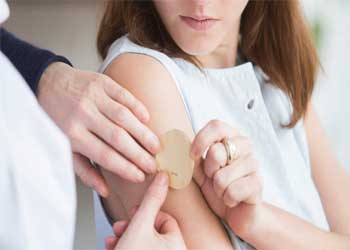- Home
- Editorial
- News
- Practice Guidelines
- Anesthesiology Guidelines
- Cancer Guidelines
- Cardiac Sciences Guidelines
- Critical Care Guidelines
- Dentistry Guidelines
- Dermatology Guidelines
- Diabetes and Endo Guidelines
- Diagnostics Guidelines
- ENT Guidelines
- Featured Practice Guidelines
- Gastroenterology Guidelines
- Geriatrics Guidelines
- Medicine Guidelines
- Nephrology Guidelines
- Neurosciences Guidelines
- Obs and Gynae Guidelines
- Ophthalmology Guidelines
- Orthopaedics Guidelines
- Paediatrics Guidelines
- Psychiatry Guidelines
- Pulmonology Guidelines
- Radiology Guidelines
- Surgery Guidelines
- Urology Guidelines
Estrogen patch, an effective add-on treatment for schizophrenia finds JAMA study

Delhi: Estradiol patch may be an effective add-on treatment for premenopausal women with schizophrenia, suggests a new study.
The study, published in the JAMA Psychiatry journal found that the adjunctive transdermal estrogen significantly improved positive and negative schizophrenia symptoms in premenopausal women. This beneficial effect of the treatment was evident in women older than 38 years.
Several pieces of evidence have suggested the positive impact of estrogen in the course of schizophrenia. A previous randomized controlled trial that estrogen patch improved symptoms in women patients of childbearing age. Yet, nothing can be said conclusively about the role of the transdermal patch in schizophrenia treatment as many initial findings on schizophrenia research are not replicated later.
Mark Weiser, Stanley Medical Research Institute, Kensington, Maryland, and colleagues evaluated the effect of transdermal estradiol added to antipsychotic treatment in women of childbearing age with schizophrenia.
The study involved a total of 200 women (median age, 38 years) who were randomized to receive either a 200-μg estradiol patch (n=100) or placebo patch (n=100) changed twice a week added to their antipsychotic treatment. The 8-week randomized, placebo-controlled trial performed in the Republic of Moldova between December 4, 2015, and July 29, 2016.
The primary outcome was the positive subscale of the Positive and Negative Syndrome Scale (PANSS; lower scores indicated fewer symptoms and higher scores indicated more symptoms). Secondary outcomes included total PANSS score and changes in negative symptoms.
Also Read: Clozapine best medication for treatment-resistant schizophrenia, claims study
Key findings include:
- At baseline, the mean positive PANSS score was 19.6 for both groups combined; at week 8, the mean positive PANSS score was 14.4 in the placebo group and 13.4 in the estradiol group.
- Compared with placebo, participants receiving add-on estradiol patches had statistically significant improvements in the primary outcome measure, PANSS positive subscale points.
- Post hoc heterogeneity analyses found that this effect occurred almost entirely in 100 participants older than 38.0 years (46 in the placebo group vs 54 in the estradiol group).
- Younger participants did not benefit from estradiol (difference, 0.08 points on the PANSS positive subscale)
- Breast tenderness was more common in the estradiol group (n = 15) than in the placebo group (n = 1) as was weight gain (14 in estradiol group vs 1 in the placebo group).
Also Read: Low estrogen and fewer menstruating years linked to Sjögren Syndrome in women
"The results should be viewed in the context of the differences in the natural course of schizophrenia between females and males," wrote the authors.
To read the complete study log on to doi:10.1001/jamapsychiatry.2019.1842

Disclaimer: This site is primarily intended for healthcare professionals. Any content/information on this website does not replace the advice of medical and/or health professionals and should not be construed as medical/diagnostic advice/endorsement or prescription. Use of this site is subject to our terms of use, privacy policy, advertisement policy. © 2020 Minerva Medical Treatment Pvt Ltd